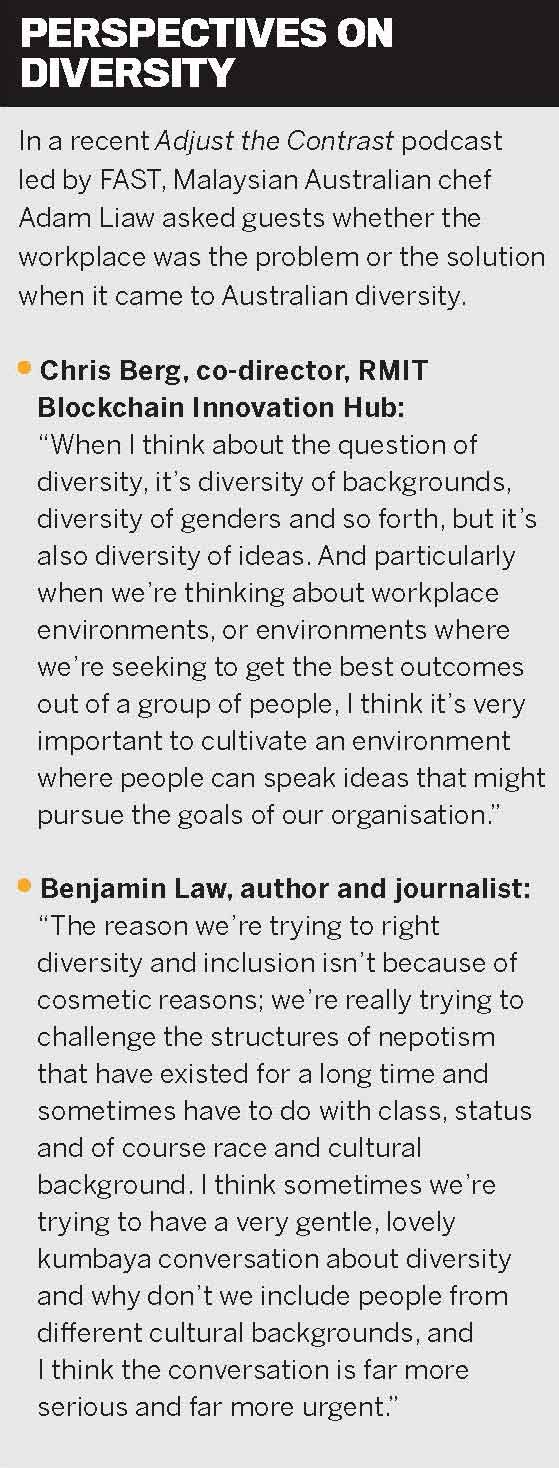Aggregator FAST has been leading the charge towards greater diversity in a series of podcasts and events

Diversity and inclusion is not something businesses should expect to happen naturally; instead it requires action, says FAST CEO Brendan Wright.
The push for greater diversity is not new, but with the world now facing the global coronavirus pandemic and all the challenges that come with it, this is a time when businesses can truly benefit. Wright says diversity and inclusion will make a real difference in dealing with challenges, enabling businesses to mitigate risks and leverage opportunities.
In the last few months FAST has released several podcasts as part of its series Adjust the Contrast, discussing the benefits of diversity. One podcast, hosted by Masterchef winner Adam Liaw, looked at the Australian workplace and whether it was the problem or the solution to the country’s diversity issues.
“By not embracing diversity, businesses can come very quickly out of step with people, customers and the community” Brendan Wright, FAST
Wright says businesses often ignore the fact that diversity is a necessary driver of innovation, adding that it is more than just a discussion point and should be used as a “practical tool”.
While gender diversity is a good place to start, Wright says it goes “way beyond that”.
“We tend to tilt towards tangible things like gender and other points of view to measure diversity in the workplace,” he explains. “[But] diversity in the workplace comes alive when you see it in the processes and procedures. In other words, it’s about the culture and the way things are done.
“There’s risk management and opportunity that comes from diversity, particularly diversity of thinking, and this is what the game is all about.”
 How diversity leads to trust
How diversity leads to trust
Diversity plays a huge role in relationships and success, especially in a service-based industry. Consumers look to businesses and question whether their leadership and people seem to represent them.
“By not embracing diversity, businesses can come very quickly out of step with people, customers and the community. They’re not engaging in the right way with their customers, and that’s the real risk,” Wright says.
But businesses that do embrace diversity build trust within the community they are looking to serve.
This goes beyond gender and race. At FAST’s recent Women in Business event, there was discussion around generational diversity. Younger generations act differently, purchase differently and think differently to those that are older. Wright uses the example of how older generations would typically go to work to pay the bills and put food on the table, but now younger generations want to go to work for a purpose, to be engaged and to contribute to something.
“If you haven’t got the right behaviours as leaders in the business, where you embrace and let them have a voice and contribute, well that’s not inclusion” Brendan Wright, FAST
“So it’s important that the diversity strategy within your business and having that diverse thinking enables you to understand those customers and then deliver the right outcome to them,” he says.
To work towards trust, Wright says the approach to diversity and inclusion needs care and attention. There is more to it than hiring someone into a role for their diversity of thinking or experience and then leaving them to it. “It takes hard work,” he says.
Leaders need to support their teams to allow different voices and perspectives to engage. With this diversity of thinking could come conflict, but Wright says this is OK.
“Conflict is not a bad thing; it can be a different point of view. Better to hear it and get a different perspective rather than have it swept under the carpet and unsaid – and that comes to the culture of business as well,” he says.
A need for confidence and calm
As for FAST, the aggregator is working towards a culture in which people are encouraged to speak up, have a view and contribute. Wright says it needs to be leader-led, but leaders do not have to come up with all the answers. Instead, it is important to allow others to have a point of view and contribute to decisions or problem-solving.
But the leadership of the business is what creates the environment in which people can engage, and this is where inclusion comes in. Juliet Bourke, who leads Deloitte Australia’s Diversity and Inclusion Consulting practice, spoke in FAST’s podcast episode Cracking the Diversity Code, and Wright refers to her analogy that inclusion is what brings diversity in and then stirs up the ingredients.
“You can have diversity, but the behaviours – including others and being inclusive – actually having those behaviours is what brings the extra value out of a diverse workplace,” he says.
“If you haven’t got the right behaviours as leaders in the business where you embrace and let them have a voice and contribute, well that’s not inclusion.”
He adds that one example of how leaders can leverage diversity is by speaking last and allowing others to put across their point of view first.
“That’s a strategy that elicits diversity. Really capable leaders do that,” Wright says.



